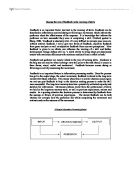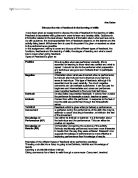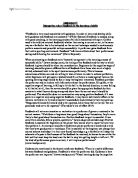“Negative feedback is more than just what is incorrect about a performance. It should include this, but also how to improve/put right any errors in technique” (Advanced PE for Edexcel). E.g. when a player in badminton does a drop shot too high, the coach would point this out and that the correct way to do it is to keep it low towards the net and make it powerful.
“Terminal feedback is received after a performance has finished” (www.geocities.com). E.g. when playing netball the coach gives the players feedback from the match.
“Concurrent feedback is gathered during the performance of the skill” (Advanced PE for Edexcel). E.g. when dancing the teacher is providing guidance to the dancer throughout the dance to improve it, like saying “keep your head up”.
COGNITIVE ASSOCIATIVE AUTONOMOUS
Thinking associating automatic
(Fitts and Posner 1947)
In the cognitive phase the best type of feedback would be extrinsic feedback given by a coach based on knowledge of performance. Positive feedback would be the correct type of feedback to use because it would encourage the learner, unlike negative feedback that may de-motivate a beginner. Concurrent feedback would be most appropriate, as it would guide the learner throughout. E.g. learning a new dance and the dance giving positive, extrinsic feedback like keep your head up if the pupil is looking down and other constructive criticism throughout to develop the pupil’s technique.
In the associative phase intrinsic feedback, as well as extrinsic feedback, would be suitable. The learner should listen to their kinaesthetic senses to judge whether it was correct or not, as well as the input from the coach. Negative and positive feedback should be given but the coach should be careful not to de-motivate the learner when giving negative feedback. Concurrent and terminal feedback are both necessary, now the learner has some knowledge of performance, terminal feedback can be given. E.g. when playing a drop shot in badminton the coach gives a selection of positive and negative feedback such as that drop shot was executed at the correct time because your opponent was at the back of the court, but you could have disguised it by making your opponent think you were going to do another over head clear when at the last moment you actually do a drop shot, this will give your opponent less time to react to the stimuli. This feedback should be given during and after the game. The learners should also listen to intrinsic feedback from their own muscles and joints.
In the autonomous phase intrinsic feedback is necessary and should be present because the learner will have a good knowledge of performance. Negative feedback should be used to improve the athlete’s performance and technique. Terminal feedback is most appropriate along with knowledge of results. E.g. in a netball game when taking a shot the player will unconsciously receive intrinsic information about how it feels based on the knowledge of performance such as how the movement feels, if it feels incorrect then the body will correct itself. The coach should give negative feedback such as you need to stretch your arms higher, this should be given after the game so the player does not make this mistake again.
“There are three basic forms of guidance or methods a teacher may use to transmit information about a performance:
- Visual
- Verbal
- Manual/mechanical”
(Physical education and the study of sport).
Visual, E.g. a dance teacher showing her pupil a move before s/he does it, Verbal, E.g. a netball coach shouts out guidance to her/his players and manual/mechanical, E.g. a badminton coach showing the player how to correctly hold the racket.
This is the information-processing model.
INPUT MEMORY OUTPUT
DECISION-MAKING
PROCESS
FEEDBACK
(Advanced PE for Edexcel).
Using badminton as an example this information-processing model shows that when information is received E.g. an incoming overhead clear, this information is put in to the memory and the decision is made to return the shot, which is the output. The returning of the shot is put in to the memory. When feedback is given next time there is an incoming overhead clear the feedback will be remembered and next time the skill is preformed correctly it will be put in to the memory about how to correctly return the shot accurately. This could be intrinsic feedback from the muscles, joints etc that help you to perform the skill accurately. This information-processing model shows the feedback is an essential part of learning and improving upon skills. E.g. if a shot is missed in badminton, extrinsic and intrinsic feedback should be given back so the mistake is not made again.
“A schema is an organised packet of information stored in the long-term memory. It helps us to make sense of situations and provides us with guidance for action” (The cognitive approach). Schemas are an essential part of learning. When a new skill is being learned, the new skill is assimilated and the structure of the schema is accommodated when further information is added. E.g. when learning a new dance you learn sections at a time, you assimilate the new information and start to make a schema, you add to it by assimilating the information and accommodating the schema. The schema can be further accommodated when feedback is given to improve the skill.
In summary there are different types of feedback, the type of feedback used to aid learning depends upon many things. For examples: The type of activity, whether it is a team sport like netball where you have to react to the stimuli or an individual sport like dancing where it is internally paced. The phase of learning, affects the type of feedback given. How the feedback is given, visually or verbally. The personality of the individual, someone who needs encouragement so positive feedback would be best. How well the learner accommodates the schema, whether they adapt quickly or slowly. In conclusion, feedback is essential in the learning of skills because it helps the learner understand the correct way of doing the skill successfully so they can attempt it. Without feedback the skill would continue to be performed incorrectly, therefore feedback is necessary, the better the feedback the better the skill can be performed.
Bibliography.
- Advanced PE for Edexcel, Frank Galligan et al, Pages 118 and 112.
- Physical education and the study of sport (second edition), R J Davis et al, page 208.
- www.brianmac.demon.co.uk/infofb.htm
- www.longroad.ac.uk/accreditation_project/subject_physical_education/acquisition_skill/information_processing/feedback.htm
- Fitts and Posner, phases of learning (1947)
- Psychology booklet - the cognitive approach, page 33.
- Thorndike’s law of effect (1914)
- www.geocities.com/sjb_physed/AlevelPE_SkillAcq_Feedback.html







